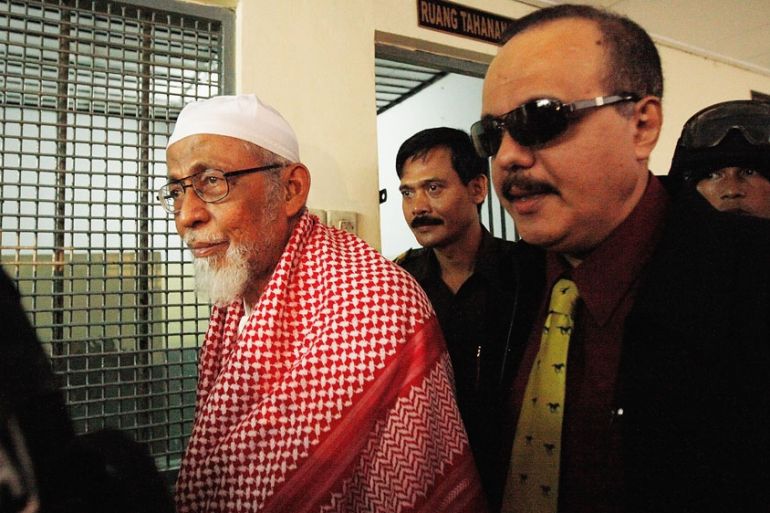Indonesia reviewing Abu Bakar Bashir’s early release
Decision to release 81-year-old cleric for humanitarian reasons criticised at home and abroad.

Indonesia is reviewing a decision to grant an early release to Abu Bakar Bashir, a Muslim leader linked to the 2002 Bali bombings, following criticism at home and overseas.
President Joko Widodo announced last week that Bashir, 81, would be given early release on humanitarian grounds, citing his old age and poor health. A legal adviser to Widodo said it would be unconditional.
Keep reading
list of 4 itemsPhotos: Ukraine marks its third Easter at war
Israeli police detain Greek consul’s guard at Orthodox Easter ceremony
Gunman kills at least six in attack on mosque in Afghanistan’s Herat
But Wiranto, the chief security minister, said on Monday the government was reviewing the unconditional release, Reuters news agency reported.
“The president has ordered related officials to immediately conduct a deeper and more comprehensive examination to respond to the request,” the minister, who uses only one name, said in a statement.
|
|
He added that authorities were “weighing up aspects like the Pancasila”, the secular state ideology which Bashir has repeatedly refused to acknowledge.
‘Legally flawed, insensitive’
Bashir was convicted under anti-terrorism laws in 2010 for links to fighters’ training and jailed for 15 years.
Although linked to the 2002 Bali bombings that killed more than 200 people from 20 countries, the cleric was not convicted in connection with the attacks. He has repeatedly denied involvement in the Bali attacks.
The move to free Bashir was criticised in Australia. It lost 88 people in the bombings.
“We have been very clear about the need to ensure that as part of our joint counterterrorism efforts … that Abu Bakar Bashir would not be in any position or in any way able to influence or incite anything,” Australian Prime Minister Scott Morrison told reporters on Monday.
After the Bali attacks, Indonesia established an elite anti-terrorism police squad known as Densus 88 or Detachment 88, which received funds and training from Australia and the United States. Last year, it passed legislation allowing the military to take part in counterterrorism operations.
Criticism of Bashir’s early release also came from the opposition party, Gerindra, with media quoting a senior party official as saying the release was a “political manoeuvre” to gain votes ahead of April’s general election.
The English-language Jakarta Post newspaper described Widodo’s decision as “poorly timed, legally flawed and insensitive”.